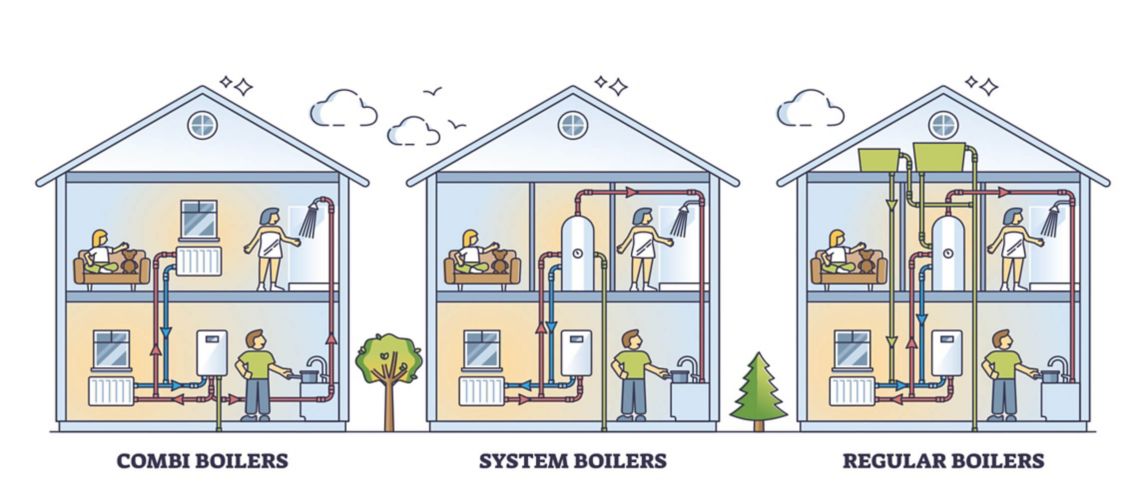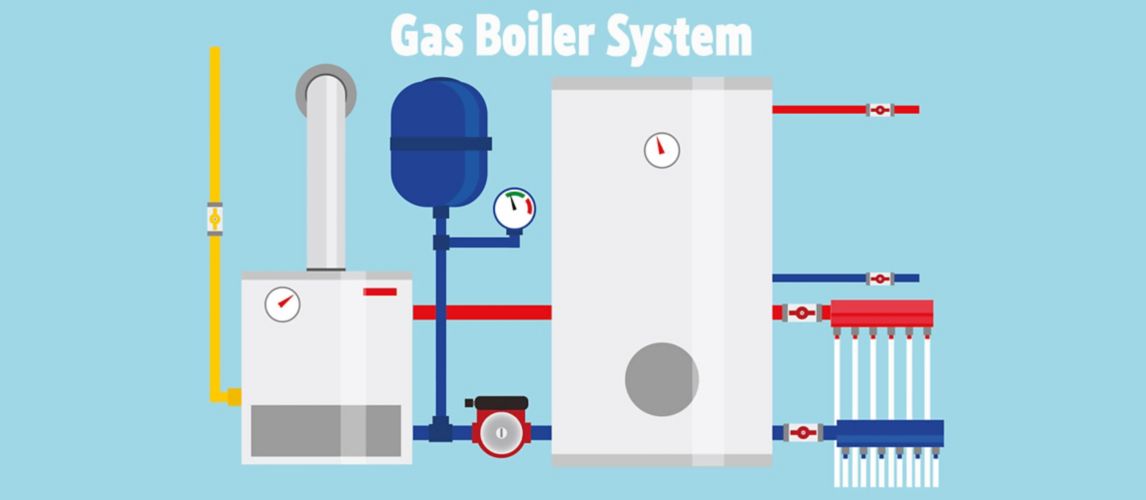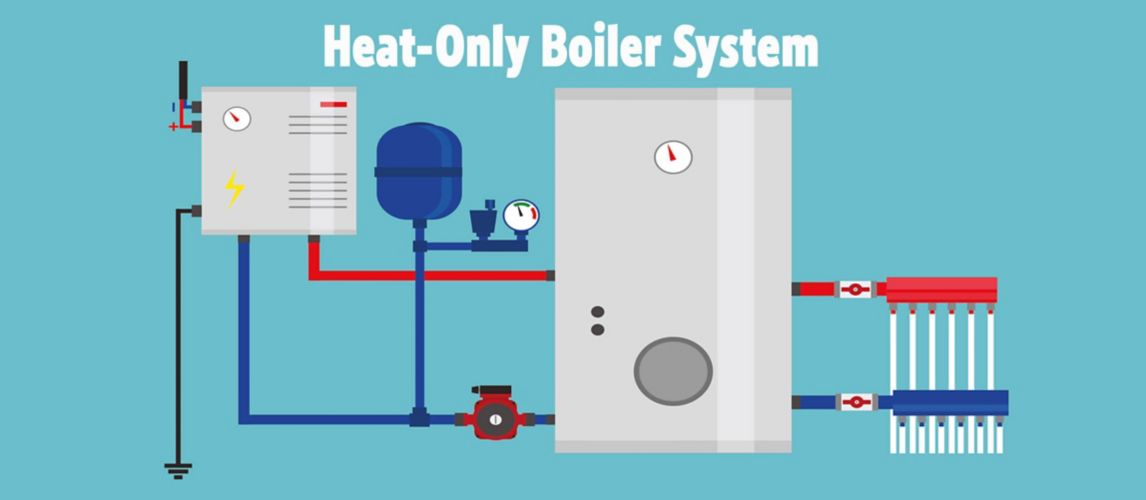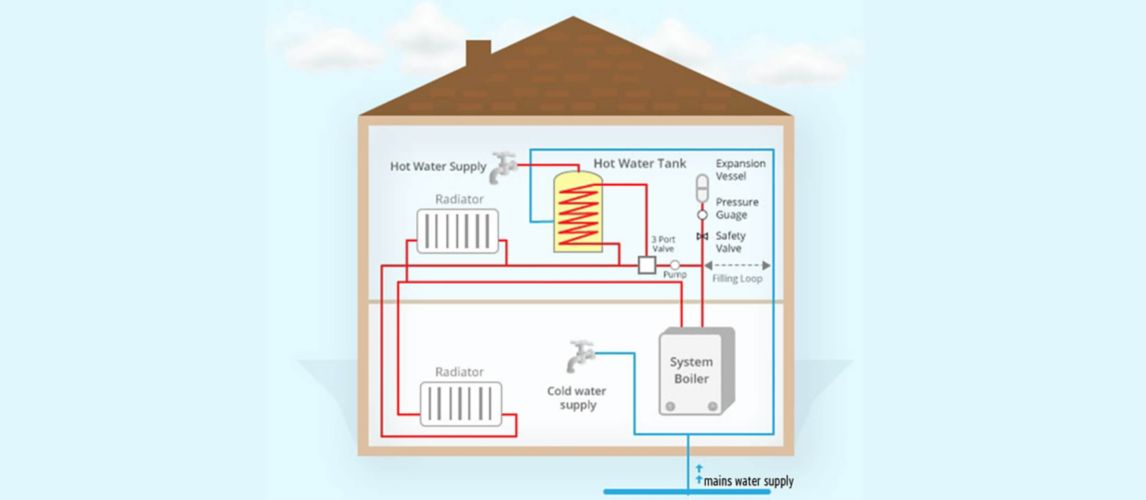BOILER BUYING GUIDE
BOILER BUYING GUIDE
Introduction
Buying a new boiler is probably one of the most significant investments a homeowner can make. But it can be tricky to know which one to get if you don’t know what to look out for.
In this boiler guide, we show you how to choose a boiler system. We’ll cover the different types of boiler available, boiler brands, sizes and energy efficiency, and help you understand when a boiler needs replacing, how much they cost to buy and install, and what you need to consider before purchasing a boiler.

Boiler Comparison: Boiler Types
There are two factors to consider when thinking about boiler types:
First is the fuel they run on. Most homes in the UK have boilers that run on gas. But for homes that aren’t connected to the gas network, there are boilers that run on oil or liquid petroleum gas (LPG) or electric boiler options.
Then, for each fuel type, there are three types of boiler available which we’ll cover in more detail in the next section:
- Combi boiler
- Heat only boiler
- System boiler
What Type of Boiler do I Need?
The type of boiler you need depends on the size of the property and the household’s heating and hot water demands. Each boiler type is more suited to certain properties than others, so it's important to understand their differences to consider what type of boiler is best.
What is a Combi Boiler?
A combi boiler is a boiler that draws water directly from the mains cold water supply and heats it on demand. For this reason, homes with a combi boiler don’t need a cold-water tank or a hot water cylinder.
The most common type of combi boiler is the compact combi, which works as we described above. But you can also buy a storage combi boiler that has a hot water cylinder included inside. This is a great solution for homes where the hot water demand is higher than a compact combi boiler can cope with.
Combi boiler pros:
- They take up less space than other boilers, and there’s no need for a cold water tank or hot water cylinder.
- They provide instant hot water, so you don’t have to wait for a water tank to heat up.
Combi boiler cons:
- You can only get hot water from one tap/shower at a time (unless you have a storage combi boiler).
- The mains water pressure limits them, so they don't work well in homes with poor water pressure.
- They contain moving parts, which means there’s more potential for breakdowns than with other boiler types.
Combi boilers are best for smaller homes or flats with only one bathroom and low water demand.
Typical Combi Boiler Heating & Hot Water System

What is a Heat Only Boiler?
A heat only or regular boiler is a boiler that draws water from a cold-water feed tank, usually stored in the loft. The boiler heats the water and sends it directly to the radiators. It’s also connected to a hot water cylinder that heats and stores the water until it’s needed. Heat only boilers are also referred to as ‘regular’ or ‘conventional’ boilers.
Heat only boiler pros:
- They meet the water demand for larger households and can supply several taps/showers at the same time.
Heat only boiler cons:
- If all the hot water in the storage tank is used up, you must wait for it to reheat before having hot water.
- They take up a lot of space because they require a cold-water tank and a hot water cylinder.
- They are less efficient than combi boilers.
Heat only boilers are best for larger homes with high water demand and multiple bathrooms that will be used at the same time.
Typical Heat Only Boiler System

What is a System Boiler?
A system boiler is a boiler that draws water directly from the mains cold water supply. But unlike a combi boiler, it doesn’t heat the water on demand. Instead, it heats water stored in a hot water cylinder. System boilers are also referred to as ‘closed vent’ or ‘sealed system’ boilers.
System boiler pros:
- They meet the water demand for larger households and can supply several taps/showers at the same time.
- They save space compared to a heat only or regular boiler because they don’t require a cold-water feed tank.
System boiler cons:
- If all the hot water in the storage tank is used up, you must wait for it to reheat before having hot water.
- They take up more space than a combi boiler because the boiler itself is usually bigger, and a hot water cylinder is required.
- They are less efficient than combi boilers.
System boilers are best for larger homes with poor water pressure and a high water demand or multiple bathrooms that may be used at the same time.
Typical System Boiler

What is a Condensing Boiler?
Although commonly known as a type of boiler, a condensing boiler is actually the technology that’s used in all new boilers sold today. It works by capturing some of the heat, that would typically be wasted in a non-condensing boiler and using it to heat water in the central heating system.
- They are around 25% more efficient than non-condensing boilers, helping to save money on energy bills.
- They produce fewer carbon emissions than non-condensing boilers.
- If they are not installed and used correctly, their efficiency is limited.
Open Vent & Sealed System Boilers
Open vent and sealed system boilers are the terms used for the central heating system a boiler uses.
An open vented system is run with a heat only boiler. It includes a cold-water feed tank, an expansion tank and a hot water cylinder.
A sealed system is run with a combi or system boiler. This system requires a hot water cylinder but doesn’t need a cold-water feed tank or expansion tank.
What Size Boiler do I Need?
When choosing a boiler size, you need to consider its physical size and the size of its heating capabilities.
The right physical size depends on the property size and how much space there is available for the boiler to go.
A boiler’s heating size is measured in kilowatts (kW). Choosing the right size depends on the property, the number of people living in it, and the number of bathrooms and radiators.
Use the table below as a guide to the correct boiler size for the property.
| Property size | Number of bathrooms | Number of radiators | Boiler size in kW* |
|---|---|---|---|
| 1-2 bedroom flat/house | 1 | Up to 10 | 24-27kW |
| 2-3 bedroom house | 2-3 | 10-15 | 28-34kW |
| 4+ bedroom house | 3-4 | 15-20 | 35-42kW |
* The boiler size range considers insulation efficiency. An older, poorly insulated home will need the largest size. In contrast, a new, well-insulated home will require the smallest size.
Boiler Brands
There are many different boiler brands and models to choose from, including leading brands like Baxi, Ideal, Vaillant, Viessmann, and Worcester Bosch, plus other lesser-known brands.
Every brand will have cheaper and high-end options available, and their longevity and reliability will vary. But the brand you choose is likely to be dependent on your budget.
Which Boilers Are The Most Energy-Efficient?
Modern boilers, or “condensing boilers” are the most efficient. Replacing an old non-condensing boiler with a condensing boiler can save £45-£300 a year on heating costs (Energy Savings Trust, 2021).
All new boilers sold today are condensing boilers. Their energy efficiency is measured with an ErP (Energy-related Products) rating, which runs on a scale (as of September 2021) from A-G).
To get the most efficient boiler, choose the highest rating possible for your budget. But it's also essential to get one that's the right size in kilowatts for the property. A heat only boiler, for example, is efficient in a larger property. But its power will be too high for a small property.
Signs You Need a New Boiler
It’s not always easy to know when to replace a boiler because faults can go unnoticed until it breaks down.
Here are the signs to look out for:
- Radiators take a long time to heat up
- A bad smell
- Increased energy bills
- Leaking water
- Unusual noises
- Regular breakdowns
- Repair costs are more than a new boiler
How Much Does a New Boiler Cost?
New boiler costs can vary significantly depending on the type of boiler, the brand, and model, and its size.
You then need to factor in installation costs. Again, these will vary depending on the type of boiler being installed and what system it is replacing, but you can typically expect to pay between £1000-£5000. The installation cost for a like-for-like replacement will be on the lower end of the scale. Whereas the installation of a different boiler and system requiring pipework or location changes will be on the upper end of the scale.
Who qualifies for a boiler grant?
Homeowners and tenants of privately rented properties who are in receipt of benefits and have a broken boiler can apply for a boiler grant. You can check if you’re likely to qualify on the Boiler Grants website.
How much is a boiler service?
Boilers should be serviced once a year by a registered Gas Safe Engineer and costs vary between different companies. According to Which? you can expect to pay between £60-£100 for a one-off service. Or a package deal, that covers the cost of breakdowns and repairs, as well as an annual service, can cost £200-£300 per year.
Installing a New Boiler
A registered Gas Safe Engineer must carry out all gas boiler installations, and an OFTEC technician must install oil boilers.
We recommend getting at least three quotes from a mix of big nationwide companies and local engineers. And each company should complete a full survey of the property to assess what work is needed.
When you assess the quotes, it’s worth weighing up each company’s professionalism and aftercare service as well as the price. Large companies are likely to be more expensive but may offer better support.
How long does it take to fit a boiler?
The length of time it takes to fit a new boiler will vary depending on the type of heating system and the amount of work involved.
Replacing a like-for-like boiler in the exact location as the old one will take around a day to complete.
But if the installation involves changing the boiler type or location, adding a new flue and other boiler accessories, or installing or removing a hot water cylinder or cold water tank, then the installation could take up to 3 days.
5 Considerations When Getting a New Boiler
It’s always important to do your research before getting a new boiler to ensure you get the right product for the property.
Here are five things to consider:
- Existing heating system
Often, the easiest and most cost-effective option is to replace a boiler based on the existing boiler and heating system so that it’s a like-for-like swap.
It is possible to install a different type of boiler, but you’ll need to consider the extra costs (for parts and installation), whether there is enough space in the property to install a cold water tank or hot water cylinder (if necessary) and whether the new boiler system is sufficient to meet the heating and hot water demands of the household. - Location of the boiler
Choosing the right location for a boiler is important because it could impact the type of boiler you can select.
All gas and oil boilers must be installed onto an external wall so waste gases can escape through a flue outside the property.
If you’re replacing like-for-like, you’ll be able to put the new boiler in the same place as the current one. But if you’ve chosen a different boiler, you need to consider its physical size. For example, if it’s bigger than the existing boiler, it may need a new location. Or, if you want to hide the boiler in a kitchen cabinet, you may need a small combi boiler.
It’s also worth bearing in mind that any change to the location of the boiler will increase the installation costs. - Location of the flue
If the boiler location is being changed, then the flue location will need to be changed too. The new site must be 30-60cm away from any opening windows or doors to prevent gases from re-entering the property. They shouldn’t be placed too close to any material that hot gasses could damage, such as plastic guttering. Also, consider the neighbours and don’t place the flue where the steam will be a nuisance. - Budget
For most people, the deciding factor on the make and model of the boiler they buy is their budget. So, setting a budget straight away will help with the decision-making process.
When setting the budget, factor in the cost of the boiler, the installation cost, plus any other parts, such as a new cold-water tank or hot water cylinder.
Always buy the best boiler possible for the budget. A top-of-the-range boiler may seem pricey, but it’s likely to be more energy-efficient and have fewer breakdowns than a lower-priced model. It may also last longer. And all these factors mean that they’ll cost less in the long term.
There are two types of flue: a round flue and a square flue. If a round flue is already installed, it can remain in place (unless the boiler is moved). But square flues are an indication of an outdated system with pipes that don’t meet current legislation. So, square flues will need to be replaced. - Warranty and manufacturer guarantees
Most boilers come with a manufacturer's guarantee that covers the cost of parts and repairs should the boiler break down within a certain period. The guarantee length varies depending on the brand and the specific model. Generally, the longer the guarantee, the more reliable the boiler is.
Warranty and Manufacturers Guarantees
Most boilers come with a manufacturer's guarantee that covers the cost of parts and repairs should the boiler break down within a certain period. The guarantee length varies depending on the brand and the specific model. Generally, the longer the guarantee, the more reliable the boiler is.
Here are some examples of the length of the manufacturer’s guarantees available:
| Brand | Minimum | Maximum |
|---|---|---|
| Ariston | 2 | 8 |
| Baxi | 3 | 10 |
| Biasi | 5 | 5 |
| Grant | 2 | 2 |
| Heatline | 2 | 2 |
| Ideal | 2 | 10 |
| Strom | 2 | 2 |
| Vailiant | 2 | 2 |
| Viessmann | 3 | 5 |
| Worcester Bosch | 2 | 12 |
Some installers also offer warranties. Unlike a guarantee, which is given for free, you pay for a warranty. They offer protection for the boiler after the manufacturer's guarantee has run out.
